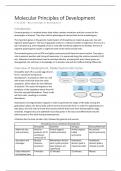Germ layers - Study guides, Class notes & Summaries
Looking for the best study guides, study notes and summaries about Germ layers? On this page you'll find 858 study documents about Germ layers.
Page 2 out of 858 results
Sort by
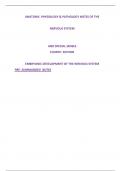
-
EMBRYONIC DEVELOPMENT OF THE NERVOUS SYSTEM
- Class notes • 19 pages • 2024
-
- $13.99
- + learn more
General Embryonic Development is Described as Either Trimesters (3x 3-Month Periods): First: - Foundations of Major Organs Second: - Development of Organs Third: - Rapid Growth & Fully Functional Organs. OR... Anatomical Stages: **(These are more relevant) Pre-Embryonic Period: 0-2 Weeks Fertilisation Blastocyst Formation & Implantation Gastrulation Embryonic Period: 3-8 Weeks Development & Differentiation of 3 Germ Layers into foundations of Organs. Foe...
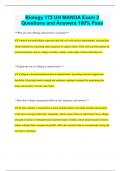
-
Biology 172 UH MANOA Exam 2 Questions and Answers 100% Pass
- Exam (elaborations) • 15 pages • 2024
-
Available in package deal
-
- $9.99
- + learn more
Biology 172 UH MANOA Exam 2 Questions and Answers 100% Pass **What are some defining characteristics of animals?** Animals are multicellular organisms that lack cell walls and are heterotrophic, meaning they obtain nutrients by consuming other organisms or organic matter. Their cells are held together by structural proteins such as collagen, and they exhibit a wide range of forms and behaviors. **Explain the role of collagen in animal bodies.** Collagen is the predominant protein in...
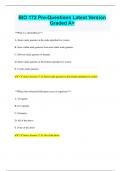
-
BIO 172 Pre-Questions Latest Version Graded A+
- Exam (elaborations) • 49 pages • 2024
-
Available in package deal
-
- $11.99
- + learn more
BIO 172 Pre-Questions Latest Version Graded A+ **What is a spermatheca?** A. Stores male gametes in the male reproductive system B. Sorts viable male gametes from non-viable male gametes C. Delivers male gametes to females D. Stores male gametes in the female reproductive system E. Creates male gametes **Correct Answer:** D. Stores male gametes in the female reproductive system **Where does internal fertilization occur in organisms?** A. Viviparity B. Ovoviparity C. Oviparity ...

-
BIO 172 UH Manoa Exam 2 Latest Update Graded A+
- Exam (elaborations) • 26 pages • 2024
- Available in package deal
-
- $9.99
- + learn more
BIO 172 UH Manoa Exam 2 Latest Update Graded A+ Animals Multicellular eukaryotes Heterotrophs: Ingest their food Lack Cell Walls Body held together by structural proteins Collagen Make up connective tissues (fibers) Flexible and high tensile (stretching) Skin Dense irregular arrangement of collagen Ligament Collagen arranged in sheets (Connects Bones) Tendon Cable-like arrangement of collagen (Connects muscle to bone) Zygote Fertilized egg (Sperm+Egg=Zygote) Undergoe...

-
BIO 172 UH Manoa Exam 2 Questions with Complete Correct Answers | Grade A+
- Exam (elaborations) • 31 pages • 2024
- Available in package deal
-
- $13.49
- + learn more
Animals Ans: Multicellular eukaryotes Heterotrophs: Ingest their food Lack Cell Walls Body held together by structural proteins Collagen Ans: Make up connective tissues (fibers) Flexible and high tensile (stretching) Skin Ans: Dense irregular arrangement of collagen Ligament Ans: Collagen arranged in sheets (Connects Bones) Tendon Ans: Cable-like arrangement of collagen (Connects muscle to bone) Zygote Ans: Fertilized egg (Sperm+Egg=Zygote) Undergoes rapid cell division cal...
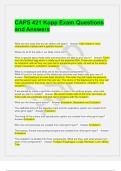
-
CAPS 421 Kopp Exam Questions and Answers
- Exam (elaborations) • 25 pages • 2024
-
- $12.99
- + learn more
CAPS 421 Kopp Exam Questions and Answers What are two ways that we can define cell types? - Answer-Cells needs to have characteristic markers and a specific function Where do all of the cells in our body come from? What is special about these cells and what they are able to give rise to? - Answer-Come from the fertilized egg which is made up of the parental DNA. These are considered to be totipotent cells as they can give rise to extraembryonic cells, as well as the embryo proper (meso...
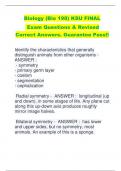
-
Biology (Bio 198) KSU FINAL Exam Questions & Revised Correct Answers. Guarantee Pass!!
- Exam (elaborations) • 40 pages • 2024
-
- $12.99
- + learn more
Biology (Bio 198) KSU FINAL Exam Questions & Revised Correct Answers. Guarantee Pass!! Identify the characteristics that generally distinguish animals from other organisms - ANSWER : - symmetry - primary germ layer - coelom - segmentation - cephalization Radial symmetry - ANSWER : longitudinal (up and down), in some stages of life. Any plane cut along this up-down axis produces roughly mirror image halves. Bilateral symmetry - ANSWER : has lower and upper sides, but no ...
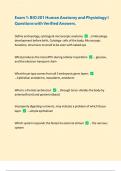
-
Exam 1: BIO 201 Human Anatomy and Physiology I Questions with Verified Answers | Latest 2024/2025
- Exam (elaborations) • 16 pages • 2024
- Available in package deal
-
- $10.99
- + learn more
Define embryology, cytology & microscopic anatomy ...Embryology- development before birth, Cytology- cells of the body, Microscopic Anatomy- structures to small to be seen with naked eye What produces the most ATPs during cellular respiration ...glucose, and the electron transport chain What tissue type comes from all 3 embryonic germ layers ...Epithelial; endoderm, mesoderm, ectoderm What is a frontal section/cut ...through torso- divides the body by anterior(front) and posteri...
Full summary for the course molecular principles of development (NWI-BB084B) - Radboud University, Nijmegen
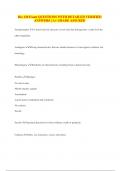
-
Bio 120 Exam QUESTIONS WITH DETAILED VERIFIED ANSWERS | A+ GRADE ASSURED
- Exam (elaborations) • 39 pages • 2024
- Available in package deal
-
- $12.48
- + learn more
Bio 120 Exam QUESTIONS WITH DETAILED VERIFIED ANSWERS | A+ GRADE ASSURED Synapomorphy A shared derived character or trait state that distinguishes a clade from the other organisms. Analagous Having characteristics that are similar because of convergent evolution, not homology. Homologous Similarity in characteristics resulting from a shared ancestry. Porifera Sponges No true tissues Mostly marine, aquatic Asymmetric 2 germ layers (endoderm and ectoderm) No coelom Sessile Sessile At...

How much did you already spend on Stuvia? Imagine there are plenty more of you out there paying for study notes, but this time YOU are the seller. Ka-ching! Discover all about earning on Stuvia



